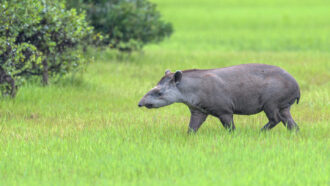
Meghan Rosen is a staff writer who reports on the life sciences for Science News. She earned a Ph.D. in biochemistry and molecular biology with an emphasis in biotechnology from the University of California, Davis, and later graduated from the science communication program at UC Santa Cruz. Prior to joining Science News in 2022, she was a media relations manager at the Howard Hughes Medical Institute. Her work has appeared in Wired, Science, and The Washington Post, among other outlets. Once for McSweeney’s, she wrote about her kids’ habit of handing her trash, a story that still makes her (and them) laugh.

Trustworthy journalism comes at a price.
Scientists and journalists share a core belief in questioning, observing and verifying to reach the truth. Science News reports on crucial research and discovery across science disciplines. We need your financial support to make it happen – every contribution makes a difference.
All Stories by Meghan Rosen
-
 Genetics
GeneticsHere are 5 cool findings from a massive project on 240 mammal genomes
A new series of studies on mammal genetics is helping scientists start to answer questions about evolution, cancer and even what makes us human.
-
 Health & Medicine
Health & MedicineA graphene “tattoo” could help hearts keep their beat
A proof-of-concept electronic heart tattoo relies on graphene to act as an ultrathin, flexible pacemaker. In rats, it treated an irregular heartbeat.
-
 Plants
PlantsStressed plants make ultrasonic clicking noises
Tomato and tobacco plants emit high frequency sounds, which could one day find a use in agriculture, as a way to detect thirsty crops.
-
 Health & Medicine
Health & MedicineSleeping sickness is nearing elimination. An experimental drug could help
Clinical trials of acoziborole are under way in sub-Saharan Africa, where sleeping sickness is endemic.
-
 Paleontology
Paleontology310-million-year-old fossil blobs might not be jellyfish after all
An ancient animal called Essexella may have been a type of burrowing sea anemone, a new study proposes.
-
 Health & Medicine
Health & MedicineAn antibody injection could one day help people with endometriosis
An injectable antibody treatment that reduced signs of endometriosis in monkeys is now being tested in a Phase 1 clinical trial in people.
-
 Animals
AnimalsWhat the first look at the genetics of Chernobyl’s dogs revealed
Dogs living in the Chernobyl Nuclear Power Plant industrial area are genetically distinct from other dogs, but scientists don’t yet know if radiation is the reason.
-
 Life
Life‘We Are Electric’ delivers the shocking story of bioelectricity
Sally Adee’s new book spotlights the underexplored science of the body’s electricity and investigates how bioelectricity could advance medicine.
-
 Health & Medicine
Health & MedicineHere’s how lemon juice may fend off kidney stones
Lemon nanoparticles slowed formation of kidney stones in rats. If the sacs work the same way in people, they could help prevent the painful crystals.
-
 Health & Medicine
Health & MedicineThe deadly VEXAS syndrome is more common than doctors thought
The recently discovered inflammatory disease, VEXAS syndrome, typically occurs in men over 50, affecting nearly 1 in 4,000 in the United States.
-
 Health & Medicine
Health & MedicineProcrastination may harm your health. Here’s what you can do
Scientists have tied procrastination to mental and physical health problems. But don't panic if you haven't started your New Year's resolutions yet.
-
 Health & Medicine
Health & MedicineThese 5 biomedical advances gave 2022 a sci-fi feel
Big steps in biology and medicine include pig to human organ transplants, synthetic embryos and a fully complete human genome.